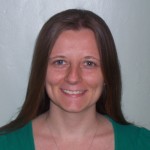Andrea Connell, M.S. ICS (2012), discusses her experience starting work at Amazon. (Interview in December, 2012.)
Hi Andrea. After finishing your M.S. in ICS, you took a job with Amazon in Seattle. Can you tell us a little bit about what you are doing now?
I am a Software Development Engineer for the Legal department at Amazon. We customize commercial off-the-shelf systems and develop custom applications that help internal Amazon employees do their jobs. To me this is the perfect type of position because I have the network and resources that come with working for a big company like Amazon, but I am also able to know my customers personally and can be in control of a project over its entire lifecycle. Internal teams also have more flexibility over the technologies that they use and a less stressful environment than other parts of the company. I code in both .NET and Java and work with Microsoft SQL Server. Sometimes I work on projects alone and other times I work with my teammates, but my work is always planned in two-week agile sprints. I also have the pleasure of working three floors below Jeff Bezos (but no, he has no idea who I am (yet)).
How did your experiences in ICS help to prepare you for your current work?
Even though our team can be more laid back than many groups at Amazon, that doesn’t mean our code can be of lower quality. Coding standards, code reviews, and unit tests are a significant part of our process. Dr. Johnson’s Software Engineering class is a very accurate representation of development in the real world. After the course I was lucky to be able to join the Collaborative Software Development Lab which gave me more in depth experience with coding tools. My team at Amazon doesn’t have automated quality assurance or continuous integration in place, but they are things we are working toward and because of my time with CSDL I can be an integral part of that progress.
Amazon also puts a lot of emphasis on the written word. It is common to start meetings by silently reading narratives of up to six pages that discuss the background and requirements for a project. This practice ensures that the author has thought out the project ahead of time and that everybody in the meeting devotes time to understanding it. Writing emphasis classes can seem unnecessary for computer science, but in my experience you will be better respected and given more opportunities if you are able to express yourself succinctly and clearly. I especially liked Dr. Quiroga’s Information Architecture class, which really made me think about how I present information.
I am also glad that I took Dr. Lim’s Analysis of Algorithms class, which prevents me from having to reinvent the wheel on many problems and gave me a good understanding of how to evaluate the performance of my code. Finally, I think of Dr. Ikehara’s Human-Computer Interaction class every time I make a user interface decision (or see somebody try to open a door the wrong way).
What advice do you have for current ICS students?
First, I don’t believe that having work experience before you graduate should be optional. No matter how good your classes are, they cannot substitute for experience working on a project that will be around longer than a semester and will be used by other people. I know it can be difficult because internships don’t always pay, but even if you have to work a second job over the summer (I’ve been there) it is worth it. Not only does work experience put you in a better position to get a job when you graduate, it puts you in a position to get a job you know you will enjoy. Limited term internships can be a great place to experiment with different facets of computer science – servers, web development, databases, security, etc – and figure out which area you are really passionate about. Read the job opportunities that Gerald sends out and use them to your advantage.
Second, know that applying for a job isn’t the only way to get a job. I never applied to work at Amazon. Big companies actively recruit new college graduates through LinkedIn, and my profile came up in their search because it listed my expected graduation date and degree. Do have a professional online profile and keep it up to date. I also received job offers from a couple of companies on the island, which I never formally applied to either. If you want a job locally, submit your resume to the career fair CD and use your network. Even if you don’t personally know anybody working in technology in Hawaii, you know people who do! Tell your professors and classmates that you are job seeking and ask them to keep you in mind if they hear of any openings.
Anything else you’d like to add?
Finishing your degree doesn’t mean that you are done learning. If you want to get certifications, it doesn’t even mean that you are done studying and taking exams. Part of the reason our field is so exciting is that it is constantly changing. Embrace that change.

